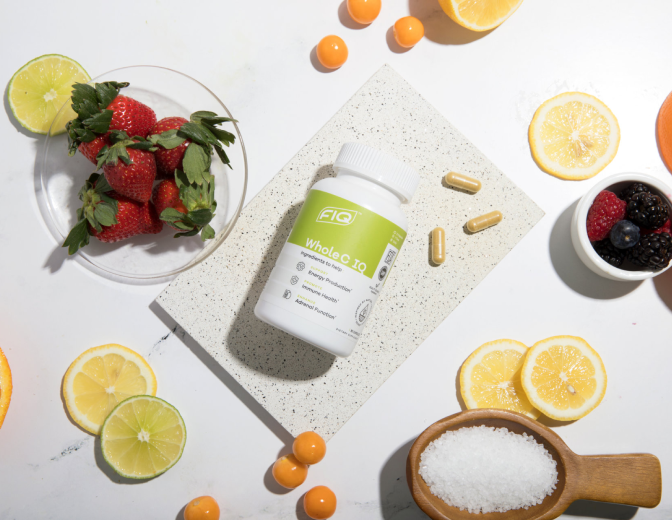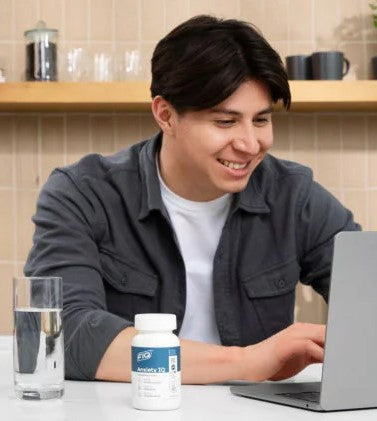Anyone who has dealt with anxiety has experienced firsthand the profound influence this mental state can have on the physical body. Each year, over 1 million people visit the ER with chest pain or other major health concerns, only to learn they are experiencing a panic attack (2). It is felt both in the body and the mind.
Thankfully, medicine and psychology have come a long way, and many healthcare providers no longer view the mind and body as separate, disconnected entities. People who suffer from mental disorders are beginning to receive the validation and help they deserve from the medical profession. Even so, we still have a ways to go.
While anxiety may be considered a “mental” disorder/illness, its influences are not limited to the mind alone. Anxiety takes a major toll on the physical body. This is evident in the chest tightness, shortness of breath, or stomach aches that many experience with anxiety. More serious health implications can be found on the microscopic level as well.
Research has linked anxiety to poorer health outcomes (3), but what’s still unclear is which comes first. Does anxiety lead to worse health outcomes, or do chronic health issues make people more susceptible to anxiety?
We may not yet know the answer to this, but we do know that chronic stress and anxiety are associated with increased inflammation (4) and elevated CRP levels (5), hormonal imbalances (6), and impaired immune function (7). We can improve long-term health outcomes by offsetting this physiologic stress load that anxiety causes. A powerful way to achieve this is to address anxiety at its core by improving the body's resiliency to stress.
What happens during anxiety?
It’s important to realize that anxiety itself is actually a beneficial adaptive response. Its purpose is to initiate protective reactions to potentially dangerous situations. Anxiety Disorder is the result of this system being activated at inappropriate times.When your brain perceives a threat:
- A message is sent from your brain to your adrenal glands, telling them to produce stress hormones such as cortisol and adrenaline. In neuroscience, this is referred to as “top-down processing.”
- The stress hormones stimulate systems useful for protecting oneself in a fight or fleeing danger. At the same time, it suppresses other systems that are not useful at the moment, like digestion or reproductive hormones (7).
- The response of these systems results in what’s referred to as “bottom-up processing.”
- Heart rate, blood pressure, and stroke volume increase.
- Respiratory rate increases and breaths are more shallow.
- Sugar is released into the blood from the liver to fuel working muscles.
- First-responder immune cells (innate immune system) migrate to the skin and organs in case they need to fight infections caused by injuries.
- A rush of blood flow to the brain enhances focus, alertness, and nerve communication (7).
Your body is incredibly intelligent. It does not do anything that doesn’t “make sense” for survival. It doesn’t waste valuable resources without reason. Anxiety doesn’t develop accidentally. Instead, it’s your body doing what it believes is best for your current survival.
In a life-threatening situation, all of these reactions are good. Ideal, in fact. It becomes a problem when they are activated during non-threatening situations or when it’s chronically activated.
When the body faces chronic stress activation:
- Chronic increases in heart rate and stroke volume can result in the thickening of the heart muscles and blood vessels, leading to high blood pressure and plaque buildup in the arteries (7).
- Constant activation of the innate immune system results in a shifted balance to the immune cells that fight viruses and internal pathogens (adaptive immune system), thus, increasing susceptibility to illness. The innate immune response is chronically “in action,” producing inflammatory cytokines that lead to systemic inflammation (7).
GABA: The Nervous System Soother
GABA is referred to in science and medicine as the “primary inhibitory neurotransmitter” because its central role is to “inhibit the transmission of action potentials,” which is the crosstalk between neurons telling them to do certain actions (8).GABA has the unique ability to calm the brain and nervous system by blocking excitatory neurotransmitters and decreasing nerve stimulation. Its role in regulating anxiety works both at the forefront when anxiety is triggered (9) and in the midst of it to help bring you back to baseline.
Sufficient GABA and GABA-receptor response helps to modulate the nervous system to protect against anxiety (10, 11). It dampens the top-down signaling to the adrenal glands that occurs in response to a stressful trigger.
Dampening the top-down signaling effectively reduces the bottom-up processing. This blocks the interoceptive signals sent from the internal body back to the brain, feeding the anxiety cycle. Thus, GABA can also interject and reduce anxiety that’s already been triggered (12).
This is why GABA is the first ingredient in Anxiety IQ. In addition to supplementing with this powerful neurotransmitter, we can support the response of our nervous system to GABA with other natural nutrients.
Anxiety-Supporting Herbs
ChamomileA centuries-old remedy, chamomile packs many health benefits that have been shown to improve anxiety and anxiety-related symptoms (13). Studies have shown that chamomile has the ability to reduce the top-down stress response (14) and improve cortisol levels (15). It can also improve bottom-up regulation by reducing excitatory neurotransmitters and modulating the nervous system (15).
In addition to reducing anxiety, chamomile is rich in diverse terpenoids and flavinoids, which provide potent healing properties. These chemical components have been shown to address various health concerns, including many of which are common symptoms of anxiety. Chamomile soothes an upset stomach, reduces inflammation, improves cardiovascular conditions, and boosts the immune system (16).
Passionflower
Passionflower is native to North America and has potent anti-anxiety effects primarily through its role in brain health (17). This exotic-looking flower improves the regulation and function of GABA in the brain by enhancing receptor function and modulating GABA production (18).
Passionflower has also been shown to positively influence memory function and learning (19).
Hops Flower
Most will likely recognize this herb as an ingredient in their favorite brew. The anti-anxiety therapeutics of hops are often credited for beers' ability to “take the edge off.” Its calming effects are due to herbals rather than alcohol, as is commonly thought.
Hops have been shown to significantly reduce self-reported anxiety (20). It also has a mild sedative effect at larger doses (21). Like Passionflower, the hops flower influences the nervous system by enhancing GABA receptors and production (22). Providing an ideal environment for restoring the internal stress response.
Lavender
Many people are familiar with lavender’s therapeutic benefits. It’s often used in oil form for its relaxing and calm scents. While inhalation of lavender is a potent anti-anxiety therapy, so too is oral lavender supplementation (23, 24). One study found oral lavender to be as effective at reducing anxiety as Lorazepam (25).
Lavender improves the stress response by improving both top-down and bottom-up processing and influences. It’s also neuroprotective, anti-inflammatory, an antioxidant, and it increases neural inhibitory tone by modulating GABA (26).
The Thoughtful Formulation Behind Anxiety IQ
All of these ingredients can be found in Anxiety IQ. While many anti-anxiety herbs and nutrients exist, these five specific ingredients were carefully selected to create natural anxiety support with dual benefits.Each of these specific ingredients has been proven to offer powerful and immediate improvements in anxiety by intervening in bottom-up processing. At the same time, each of them also works to modulate the nervous system to improve long-term top-down processing, in other words, make stressful events seem less stressful.
This is a formula that you can feel the moment you take it—making it helpful for facing and dealing with daily anxiety and stress. When taking over time, many users report improved stress resiliency. Given the long-term health impacts of stress and anxiety, taking steps now to reduce the chronic stress load can have profound benefits on long-term health outcomes.




